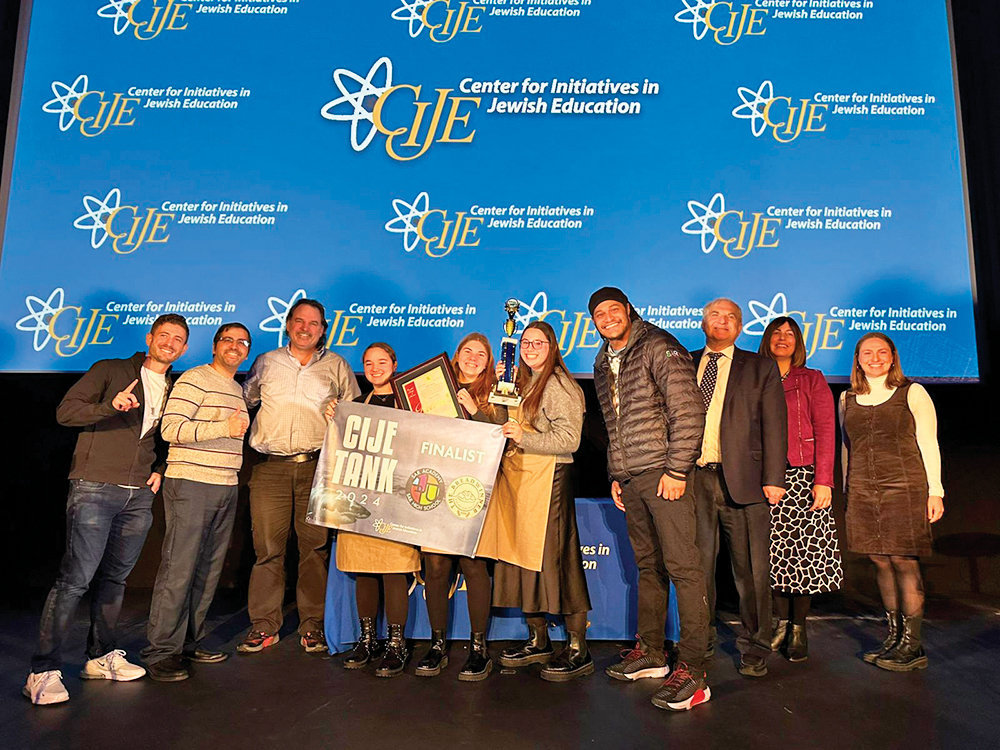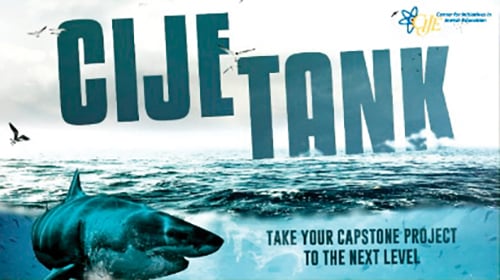SAR team wins grand prize.

The BreadWinner, a project by three SAR High School students, was the grand prize winner at CIJE Tank 2024, held at the Museum of the Moving Image in Queens on Sunday, November 24. By finishing first in the competition, which consisted of over 500 entries by thousands of students from Jewish high schools across the country, the winners gained the sponsorship of Nathan Renov to collaborate with his law firm (Pillsbury Winthrop Shaw Pittman LLP) to obtain
a provisional patent for their product, a machine that alerts a person when their dough has properly risen.
Hundreds of people gathered in the Sumner M. Redstone Theater to watch the pitches from 12 teams, the finalists from capstone projects that had been demonstrated in May on Innovation Day. But while the first round of presentations six months earlier were more like a science fair, the proceedings at CIJE Tank were much more reminiscent of Shark Tank, the television show that popularized the concept of convincing investors to back a business concept.
The Center for Initiatives in Jewish Education (CIJE) coordinated this yearlong endeavor that culminated in an amazing display of what Jewish education has to offer in 2024. Created in 2001, CIJE coordinates educational programs in more than 200 Jewish schools across the country. Those programs impact the learning of more than 70,000 students each year and focus on both the ever-relevant (collaborating in teams, developing critical thinking skills and finding solutions) and the futuristic (the STEAM component). According to the organization, the goal is to prepare the next generation for innovation by funding programs with advanced technology, developing engaging curricula, and providing ongoing teacher training, mentorship and school visits by engineers.

“CIJE Tank provides a unique opportunity for students to express their work outside of the classroom, in a real world environment, while pushing them to take their skills to the next level,” said CIJE Director of Curriculum Development Adam Jerozolim about the culminating event.
The BreadWinner came out on top after a great pitch by Oriyan Weinberger, Lia Tuchman and Rinat Kramer-Richard. Wearing branded aprons, the girls tackled the problem of a person attempting to make bread at home, but having to deal with potentially under- or over-rising their dough. A key factor was a poll they had done that indicated that most people simply judged their dough by sight, an inaccurate unit of measure. Their box not only included lights, sounds, and text message alerts when the dough had doubled in size, it also featured a heating component that allowed the user to speed up the rising process if short on time (like trying to make challah before shabbat).
“It couldn’t have happened to a more deserving group of girls,” said Felix Caso, design engineer teacher at SAR. “Since February, they’ve poured their hearts into this project — from the polished website to the product and presentation, everything was spot on. I’m so proud of how they’ve worked so hard to bring something they truly care about to life.”
The panel of judges also handed out awards to five other projects. The Distinguished Presentation Award went to the team behind GumGauge. Abie Chalem, Josh Strauss, Dylan Samuel and Diego Selem of Posnack Jewish Day School in Davie, Florida had to go to great lengths to describe what was surely the most technologically advanced project. Their product was developed to more efficiently determine if a person has gum disease.
A more financial accolade was given to Talia Braun and Dalia Hess of Bruriah High School for Girls in Elizabeth. The Prevent System received the Comprehensive Business Plan and Research Award as the group had clearly taken the time to do market research that demonstrated their potential earnings from the automatic dryer vent fan that would help prevent lint fires.

The Excellence in Innovation Award was presented to Zachary Krohn, Mayer Prager and Logan Wagh of the Torah Academy of Bergen County in Teaneck for their new model of hot water urn. The URN-EASE allows sabbath observant Jews to use hot water to make beverages on shabbat without needing to first pour the water into another cup because it has an extra chamber built in. They even had a rabbinic approval for their invention.
“These students came to me very early on with their idea for a shabbat urn with a built-in kli sheini,” said Aryeh Tiefenbrunn, TABC’s STEM coordinator. “During the process, they went through a lot of iterations and there were points when they were really stuck. I’m so proud of the way they worked through the challenges and created an excellent prototype.”
But the most impressive prototype was certainly that of the SafeTea Locker. Celia Fenster, Zvi Jenkelowitz and Yair Nemetski of The Frisch School took home the Superior Prototype Fabrication Award for their invention, a system of lockers that would ensure that people ordering drinks (or food) for mobile pickup got the correct order. Their technology would send the user a code and locker number which would unlock their order upon pickup. No more drink theft, no more employees having to hand out drinks while checking phones, no more hassle.
The Tidy Tiger from Golda Och Academy in West Orange surely would have won an award for cutest prototype, but Maya Levine and Emily Maines had to settle for the Advanced Coding and Engineering Award. Their project helps children to potty train using a child-friendly dispenser. Not only does the machine look like a cute animal, it has motivational messages for kids and a motion sensor to dispense toilet paper in sanitary fashion.
The other finalists’ products sought to make the world better in very different ways. The Handy Hammer, a project by Chana Merzdov, Rina Feder and Rivi Gal of Lev Bais Yaakov High School in Brooklyn, combined a stud finder and a hammer to prevent users from bursting pipes while trying to do work on their homes. A more recreational project was the TimeOutWhistle. Invented by Tzvi Cohen, Yonatan Feit and Ezra Romanoff of JEC High School in Elizabeth, the TimeOutWhistle combined an air pressure sensor and a Wi-Fi transmitter to allow the referee to remotely operate the game clock for sports, essentially cutting out the middleman and therefore the source of most timing mishaps. On a less active note, students at Mesivta Ateres Yaakov in Lawrence wanted to make shabbat restful again. Rafi Klahr, Yehuda Orbach and Avi Traube demonstrated their Shabbos Alarm Clock, which used a more analog solution than you might think. Like a Shabbat lamp but with sound proofing and buzzers, their invention allowed the user to unscrew one of many valves before going to sleep, thereby causing a buzzer to be heard at a specific time.
Despite it being a competitive atmosphere, most of the students were very friendly and were even talking to their competition about their projects. That’s the kind of atmosphere that CIJE wants to create.
“At CIJE, we foster collaboration among schools, enabling students to compete and learn from peers nationwide,” said CIJE Director of Innovation Orly Nadler about the overall reach of the program. “We establish platforms and cohorts for teachers to share insights, reflect and elevate their curricula. CIJE Tank exemplifies our mission by providing a framework that bridges classroom learning with real-world opportunities, connecting students with professionals from the tech and business sectors while uniting participants from diverse Jewish day schools.”
One theme that did seem to arise was that of personal safety. The Mountain Mate, a hiking accessory meant to help its owner in case of getting lost, a fall, or other mishaps was the brainchild of Rena Hammerman, Shira Hope and Leah Raich of The Leffell School in Westchester. Built-in lights, sirens and GPS would make the trekking poles innovative compared to the current options. Elana Bernstein, Menucha Rahbaran and Adira Herman created the Pyro Companion in order to upgrade fire safety. The students from Bais Yaakov of Baltimore’s smart fire extinguisher not only had a type of built-in smoke detector, but during a fire it could project audio instructions for a user to hear, making the fire extinguisher easier to use. Staying on the topic of fire safety, the Smart Smoke Sensor (Mindy Mirsky, Tikva Shmulewitz, Rachel Leah Dobay and Esti Tratner of Shevach High School in Queens) advanced the technology in current smoke detectors by using new features to detect the reason for smoke and determine whether or not the fire department needed to be called or if the smoke was caused by something simple like burnt toast.
With all the great projects presented, the audience did not envy the judges. This year’s panel of “sharks” consisted of Ari Gilder (a senior staff software engineer at Google), Natalia Jacobowitz (a product manager at a robotics startup), and Zoli Honig (an entrepreneur and innovator who has started three businesses and appeared on Shark Tank). The crowd was even treated to a short talk by Honig about his episode of Shark Tank and what it was like to do everything on the big stage.
“This year’s projects were a big step up in terms of quality, presentation, and innovation,” said Gilder, who has served as a “shark” in the past. “I really enjoyed watching how these students approached practical everyday problems in unique ways. There were multiple inventions that I would absolutely purchase if they were on the market. Kudos to CIJE and the mentors for immersing these kids in the real challenges of engineering.”
Even if only one team walked away with the grand prize and the funding to hopefully market their product, others seemed like they might continue on in some other form. You just might see them on the shelves someday in the future.
Nati Burnside is a freelance writer living in Fair Lawn and is a man of many interests. He can be reached at NatiBurnside@gmail.com.








